The President of the Republic of Kosovo Vjosa Osmani, during her official visit to Slovenia, bestowed the Presidential Military Medal to the Slovenian troops, as part of the NATO/KFOR peacekeeping mission in Kosovo © Pesident-ksgov.net
“Kosovo is not a part of Serbia,” said Slobodan Milosević, a former president of Serbia when it was a province of Yugoslavia, “It is the very heart of Serbia.” It may not be wise to follow the opinions of Milosević himself, because he would hardly count as an unbiased witness. And in any case, times have changed, although Milosević was right in saying that it’s NOT a part of Serbia. In fact it’s now even less a “part of Serbia” that when Milosević said it. For Kosovo is Europe’s youngest state, but it’s not a part of the European Union, although many observers say it could become one in the foreseeable future. It would have to disentangle itself entirely from the clutches of Serbia and its Russian masters first. Certainly, its current president, Vjosa Osmani thinks it should be in the EU and has argued that point firmly with European Commission President Ursula Von der Leyen. With regard to the current dispute over the imposition of Kosovan vehicle registrations, Osmani stressed that what Kosovo is doing is aimed at “fulfilling a legal requirement”, while Serbia, urged on by Russia, is deliberately stirring up trouble. Osmani wants the entire international community to condemn Serbia’s blatant attempts at destabilisation. Osmani is a firm believer in the law, having gained a bachelor’s degree in law from Kosovo’s University of Pristina, followed by a Master’s Degree from the University of Pittsburgh School of Law and later a doctorate in juridical science. She believes firmly in the law.
Osmani told Von der Leyen in no uncertain terms that the EU should have a clear strategy for integrating the Western Balkans, including Kosovo, of course. Osmani pointed out that Kosovo has already met all the criteria required for liberalising the visa regime and she asked the EU to honour the promises it made to Kosovo. She also asked for the existing EU member states to respect the recommendation about Kosovo made by the Commission. Von der Leyen talked to her about how Kosovo fits into EU’s Economic and Investment Plan (EIP), especially with regard to sustainable development, economic growth and the empowerment of women and young people.
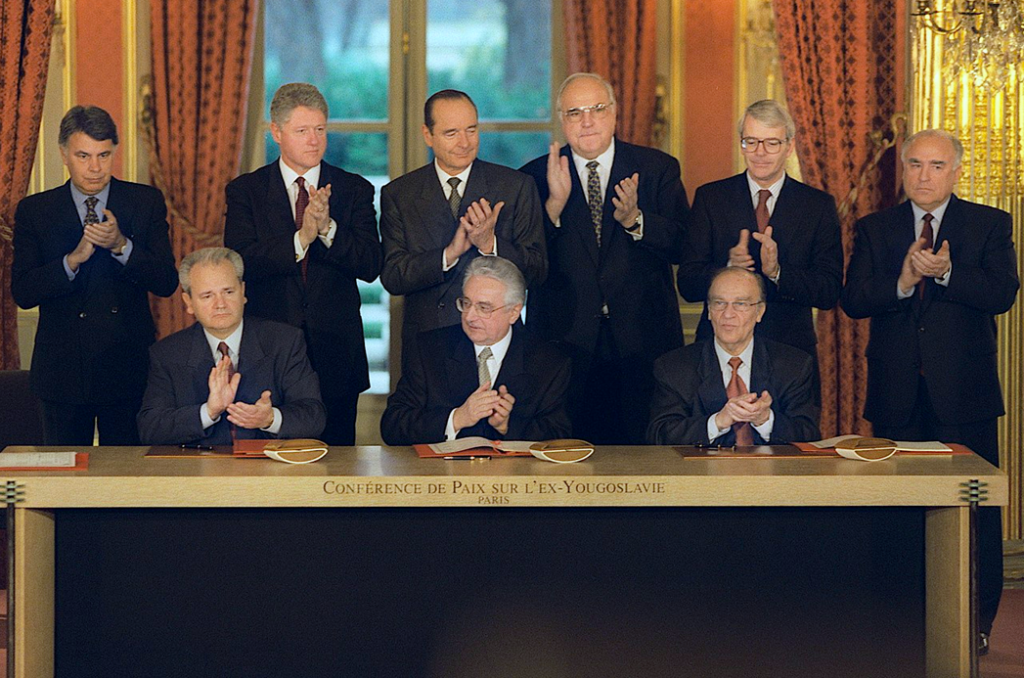
They also discussed the vehicle licence plate issue that has caused serious friction in the north of the country, with Serb citizens refusing to use the new plates. Osmani warned Von der Leyen that neighbouring Serbia, backed and encouraged by Russia, is encouraging the problems there with a view to destabilising the entire area, which would be to nobody’s benefit, except, perhaps, Serbia and Russia. Osmani has good reason to fear those who would overrun her country; she once admitted that she “can still feel” the barrel of an AK-47 riffle that a soldier thrust into her mouth when her home in Mitrovica was raided by Serb forces. She was a teenager at the time but it’s the sort of experience one tends to remember. Serbs still conduct such raids today; one local claimed they were held “to create some kind of fear and tension”.
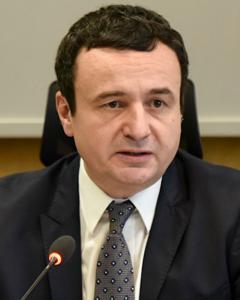
Closer links with the EU for Kosovo are hampered, of course, by the fact that not all EU member states recognise its independence, although Vasilis Maragos of the European Commission has expressed his gratitude for Kosovo’s stance on the Russian invasion of Ukraine, even though it’s not obliged to adopt EU positions on foreign policy. He also pledged to help Kosovo over any economic consequences that result. The general feeling in this debate in the European Parliament was that relations between Kosovo and Serbia should be “normalised”, but the most recent discussion organised by the EU to achieve that has ended in failure and there seems little prospect of it being sorted out anytime soon.
After the meeting, Josep Borrell, the EU’s high representative for foreign affairs, said: “Today, there is no agreement.” Borrell told journalists that Kosovo Prime Minister Albin Kurti and Serbian president Aleksandar Vučić would not agree to holding regular talks in a bid to hasten eventual agreement. Basically, it seems as if Serbia is still hopeful of taking back Kosovo altogether.
WHO’S IN CHARGE?
If Kosovo is really the heart of Serbia (as the Serbians have claimed), it’s a heart that’s in dire need of cardiac surgery. Kosovo declared its independence from Serbia almost a decade after a small war that eventually ended when NATO intervened against the Belgrade-based regime of Milosević. That led to the Kumanovo Agreement, under which all of Milosević’s forces had to withdraw from a province that was, in any case, primarily ethnically Albanian, not Serbian. The ethnicity issue there is hugely complicated. Kosovo became the only UN protectorate in Europe. The EU and others poured money into the region to help shore up its independence and to help turn it into a proper democracy. Serbia, meanwhile, viewed and still views Kosovo as part of its own territory, much as Russia sees Ukraine as part of its territory, and strives to keep Kosovo out of such organisations as the United Nations, the EU and Interpol. Kosovo does, however, use the euro as its currency, whatever Vučić may think.
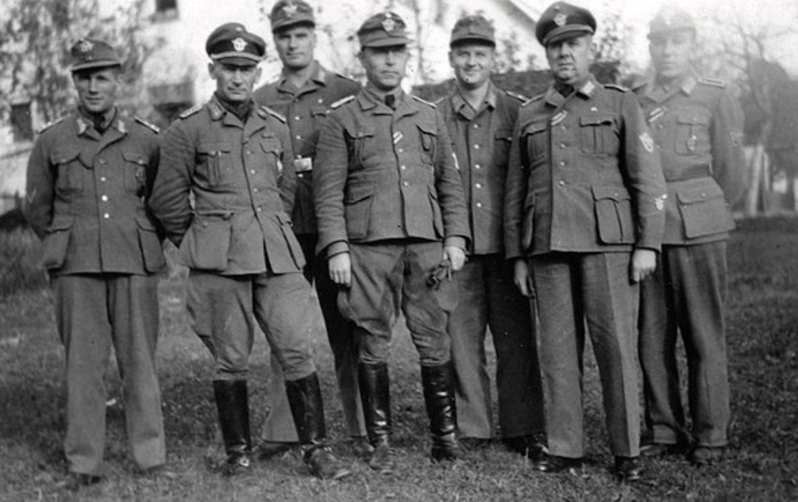
As for Milosević himself, I remember him as a man who liked to laugh, albeit not a man I’d trust, the sort that would be good company in a bar somewhere, probably telling off-colour jokes and enjoying a drink or three. He was certainly joking to the small group of journalists from various EU countries of which I was part. Most of the jokes he told were at the expense of Croatian president Franjo Tuđman, who was always eager to stand up for the Croatians, even getting himself expelled from the Communist Party for claiming that the Yugoslav authorities had played up the crimes of Croatian Nazis during the Second World War just to discredit them further (even though mere membership of the Nazi party was not something most people would have wanted to boast about by then, even if they had joined because they liked the idea of discipline, rather than mass slaughter). Milosević sought to amuse us journalists and laugh at his jokes, albeit in a somewhat embarrassed way.
Both men were, of course, Communists, at least in theory. Both men are no longer with us, but Serbia continues in its bid to ensure, at least for the time being, that Kosovo can never join a number of European and international organisations. To obtain a long-stay visa for Belgium (known as a “D” visa), for someone in Kosovo, for instance, it’s necessary to apply in Sofia, applicants are told, even though they will need a different visa even to enter Bulgaria in order to apply for one. It makes no sense, although perhaps Franz Kafka, author of The Trial, might have understood, or at least sympathised. Serbia has been heading an international campaign to get recognition of Kosovo’s status as an independent country reversed by as many countries as possible. Serbia wants Kosovo back under its wing, even though the two countries plainly don’t get on and are racially divided. It’s all about territories and control, but the EU hasn’t given up, trying to achieve peace and harmony while Russia attempts the opposite. It’s a difficult road to peace that Osmani is walking, with many tripwires provided by a war-mongering Moscow.

Kosovo has a parliamentary Assembly comprising 120 members, each elected for a 4-year term. It also has twenty reserved seats, ten for Kosovar Serbs and ten for non-Serb minorities, such as the Roma. Winning a seat is always quite a battle because there are quite a few parties who must cooperate to form coalition governments. All Kosovo’s laws have to be passed in the Assembly, which must also ratify treaties, appoint the President and Prime Minister, as well as the justices, and adopt a budget. Currently, it’s the left-of-centre anti-establishment Vetevendosje party that’s in charge. Osmani began her political career in the centre-right Democratic League of Kosovo party (LDK) and she was instrumental in her country’s independence by defending the legality of independence at the International Court of Justice. Osmani clashed with the LDK in protest at it forming a coalition with the rival Democratic Party of Kosovo (PDK), which it had promised it would never do. She became acting President after the incumbent of the time stepped down and she was chosen to take his place. She formed her own party, called Guxo, in 2021 and aligned it with Vetevendosje. Osmani won a vote to act as President.
So, let’s look at why the current row is happening. Throughout the late Middle Ages, a great deal of the Balkans lay within the territory of the Byzantine Empire, described in an old (1939) French history book about Byzance (Byzantium) that I bought on a flea market in Brussels long ago, as: “une civilisation bárbare et merveilleuse, superstitieuse et cruelle: drames politiques, drames amoureux, drames religieux, vengeance, intrigues, coups de force, interminables discussions théologiques, complots d’eunuques, vêtements semés de pierrries, palais de marbre incrustés de mosaïques.” (a Bárbarous and wonderful civilization, superstitious and cruel: political dramas, love dramas, religious dramas, revenge, intrigues, coups de force, endless theological discussions, eunuch plots, clothes strewn with stones, marble palaces inlaid with mosaics).

With such a background we should not, perhaps, be surprised at the more recent history of Kosovo. Byzantium sounds like the thrilling, exciting sort of place in which you would not want to live. It would be like living under that ancient Chinese curse: “may you live in interesting times” And if you did, it probably would not have been for very long.
EMPIRES OF THE PAST
From the 6th century on, the area was home to the South Slav people, which included the Serbs, while in the South-West of the country, an Albanian settlement was developing. As the Byzantine power waned, the region around Kosovo became the centre of a Serbian empire, under the Nemanjić dynasty. Records suggests the territory was overwhelmingly Serb, but with a small Albanian minority. The Britannica website informs us that from the mid-12th to the mid-14th century the region was lavishly endowed with sites sacred to the Serbian Orthodox church, one monastery alone boasting more than a thousand frescoes. Things were not destined to go their way for very long, however, and at the Battle of Kosovo (we’ll come back to that), fought near Pristina, an army of Turkey’s Ottoman Empire defeated a force of Serbs and their allies. Afterwards, the Turks penetrated well to the west of Constantinople, deep into Balkan Europe, while the Christian world was riven with schism, faction, and corruption which in combination were causing loyal churchgoers to quit their faith or emigrate in droves.
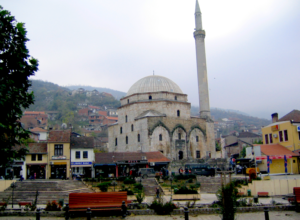
By the middle of the 15th century, the Turks had imposed direct rule over the whole of Serbia, including Kosovo. Many Christian Orthodox Serbs migrated northward or westward to reunite with their co-religionists, although a few converted to Islam. In popular memory, Kosovo came to represent Serbia’s “golden age” of greatness. Today, most Kosovans are Muslim, although many are non-practising, while most Kosovan Serbs are Christian Orthodox.
Serbia finally won its independence from the Ottoman Empire in the early 19th century and regained control of Kosovo in 1912, although it lost it three years later, during the First World War. It suffered more than most countries through the war which, of course, had begun with the assassination of Austria-Hungary’s Archduke Ferdinand in Sarajevo, the capital and cultural centre of Bosnia-Herzegovina. It was war right on the doorstep, but it was a war Austria-Hungary wanted anyway, as an excuse to get tough with the Serbs, who Vienna thought were getting too ambitious. Many of the Habsburg empire’s supposed allies sympathised with the Serbs. The Serb soldiers weren’t even issued with boots, despite a savage winter, and some 240,000 soldiers and civilians died of cold, starvation, disease and enemy action as they sought a way out of their troubled country.
In 1918, various military occupations were sorted out and Kosovo was left to become incorporated into the new Kingdom of the Serbs, Croats and Slovenes, which was later renamed Yugoslavia but was in any case a part of Serbia. Throughout this time, however, the ethnic balance was changing in favour of Albanians, with Prizren emerging as an important centre of Albanian culture and ethnic identity. In the 1980s and the haggling and toing and froing thereafter, Slobodan Milosević wanted to dominate the messy rule, and having gained control of four of Yugoslavia’s eight constituent Communist parties, he stripped Kosovo of its autonomy. Kosovo’s ethnic Albanians were furious and staged violent protests, so Milosević brought in troops to control them. Milosević wasn’t finished, however: he dissolved Kosovo’s assembly and closed any schools teaching in the Albanian language. The Kosovars held a referendum (not recognised by the Serbs) and voted overwhelmingly to secede from Serbia and from Yugoslavia.

That is partly why the federal Yugoslav state disintegrated, so that in 1992, a new Yugoslav state was founded comprising only Serbia and Montenegro. The Kosovars adopted a pacifist response under Ibrahim Rugova, organising a network of Albanian language schools and other institutions. They also adopted a policy of non-cooperation. Despite most Kosovar-Albanians being committed to non-violence, a Kosovar Liberation Army (KLA) developed, frequently attacking Serbian police and officials. The Serbs responded with a very violent crackdown that drove hundreds into the arms of the KLA as new recruits. NATO stepped in as international alarm grew, bombing Serb targets. As Albanian refugees started returning, some of the Serbs began to flee. A UN plan to deliver self-rule (not full independence) was stymied by the Serbian government’s opposition. Talks were clearly not getting anywhere and in 2008, Kosovo simply declared its independence. The Serb minority were not happy about it and Kosovo remains a disturbed and not entirely happy province, but with at least some hope of peace one day and a reasonable level of employment. There is, it’s claimed, a better level of understanding over religious faith now and Osmani addressed a message of peace to Kosovo’s many Muslims to mark their celebration of Eid. “Sacrifices accompany humanity throughout its life journey and that holidays such as Eid bring to the surface interpersonal solidarity,” she said. “Our people understand very well what sacrifice means. This holiday finds us in a better position than on the last Eid. Share with others today not only the goods from your tables, spread love, kindness, care, and harmony with everyone today!”
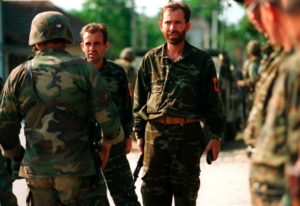
Going back a little further, we should take a look at the Balkan Wars, which were fought from 1912 to 1913 and were really two separate conflicts, rather than one on-going one. They resulted in the Ottoman Empire losing all of its remaining territory in Europe with a couple of very small exceptions: Thrace and the city of Adrianople. Thrace, or in modern Greek Thráki, is explained in the online version of Britannica like this: “To the ancient Greeks it was that part of the Balkans between the River Danube to the north and the Aegean Sea to the south. It is bounded on the east by the Black Sea and by the Sea of Marmara and to the west by mountains east of the Vardar” (in Modern Greek, it’s the Axiós or Vardárais River). It’s very complicated and it’s actually easier to look at where it is on a map, although the map I have in front of me doesn’t really make it clear enough. So, one war down, another to go. This one, the Second Balkan War, began when there was a bitter argument among the Balkan allies – Serbia, Greece and Bulgaria – over how to divide up and share out the spoils. That led to hostilities restarting in 1913 between Bulgaria and the combined forces of Serbia and Greece, who were joined by Romania.
WHAT’S IN A NAME?
According to Britannica, the Balkan Wars were caused by the discontent in Serbia, Bulgaria and Greece that resulted from what it refers to as ‘disorder’ in Macedonia. The Young Turks, in coming to power, imposed not only much-needed reform but also centralised power in Constantinople (Istanbul, as it is now, of course). As Britannica explains, “There were, therefore, no concessions to the Christian nationalities of Macedonia, which consisted not only of Macedonians but also of Serbs, Bulgarians, Greeks, and Vlachs”. Who were the Vlachs?
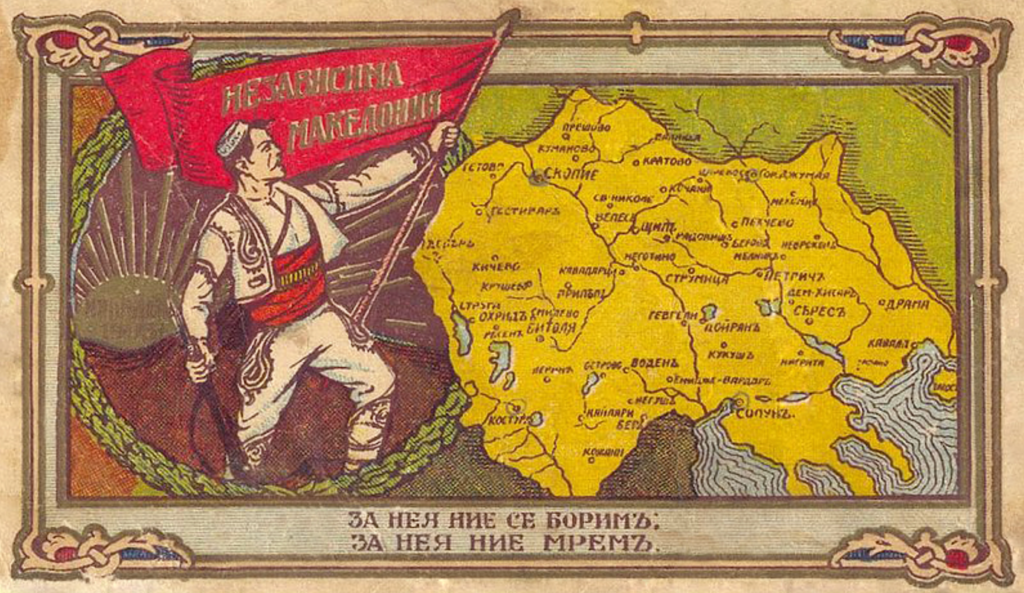
Britannica again: “there was a military class of Vlachs in Serbia and Ottoman Macedonia, made up of Christians who served as auxiliary forces and had the same rights as Muslims, but their origin is not entirely clear”. The Vlachs, also called the Vlah, with the alternative names of the Armãn and Rãmãn, are also known as the Aromanioan, Macedoromanian and Macedo-Vlach. That’s as hard to pronounce as to understand, it seems. It’s amazing that they didn’t all develop identity crises with so many different and (to western ears) unpronounceable names by which to identify themselves. They must have needed exceptionally good memories.
Meanwhile, the Albanians were developing a growing sense of nationalism, which led to the formation of the Albanian League, which was a breeding ground for opposition to the centralist policies of the Young Turks. Opposition to the Turkish administration came, at least in part, from the Internal Macedonian Revolutionary Organisation (IMRO), founded in 1893. Inevitably, there were clashes which served to exacerbate anti-Turkish feelings as well as a public urge to resist the Turkish rulers who were in charge. The IMRO grew in power and influence, partly by organising armed groups to offer resistance to the Turkish administration.
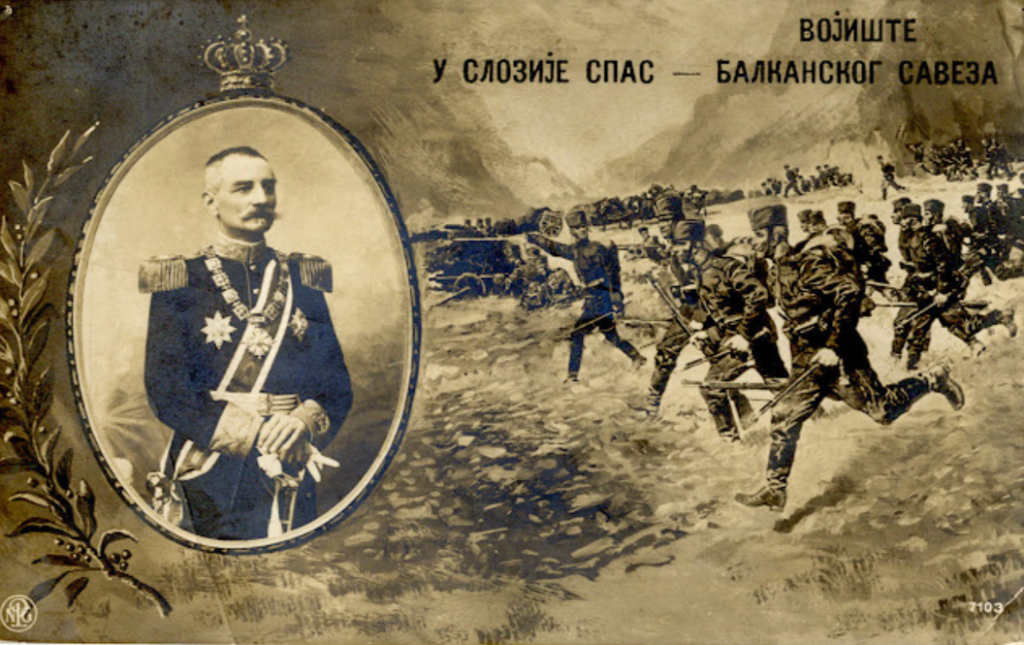
Meanwhile, the public opinion in Bulgaria was turning towards a tougher stance, thus making the IMRO a big issue in Bulgarian politics. Not to be left out of this toughening anti-Turk feeling, a similar organisation began to operate in Serbia, the Narodna Odbrana, or “national defence”, founded in 1911. The organisation was better known as the Black Hand, although it was officially called “Union or Death”, and it organised Serbian resistance in Macedonia. Britannica reports that the activities of the Black Hand, which had craftily infiltrated Narodna Odbrana, led in 1903 to the formation of an armed group to defend Greek interests, but Greece was just as interested in extending its territory in the Aegean Islands (holidaymakers sunning themselves on those beaches ought, perhaps, to bear in mind that a lot of blood was shed there in the past).
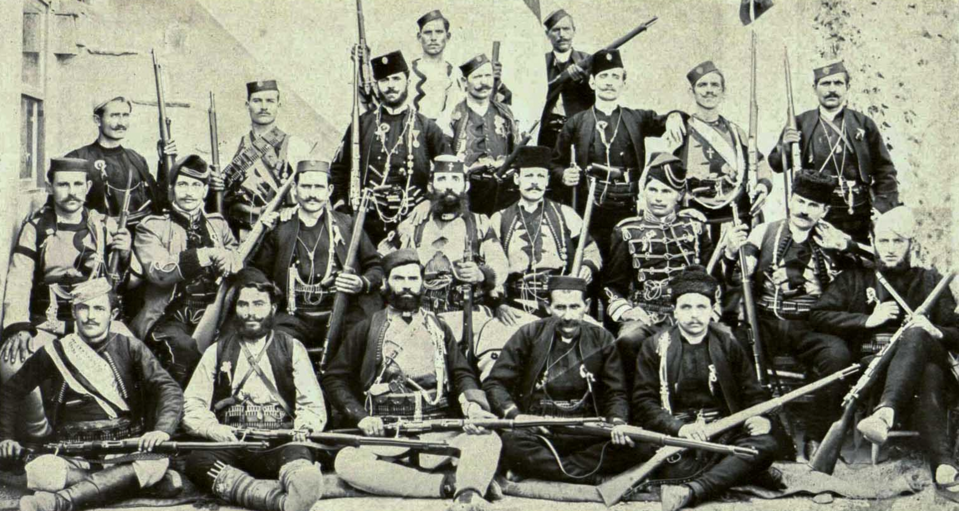
Initially, the Greeks, Serbs and Bulgarians were often in conflict until in 1911 they realised that their main enemies were the Turks, and they could only achieve the goal of defeating them by working together.
Kosovo seems to have been unusually unlucky in its neighbours and their interactions with one another. For example, in 1908, Austria-Hungary annexed Bosnia and Herzegovina, which, although they were legally part of the Ottoman Empire, were under the control of the Austro-Hungarians and had been since 1878, when the Congress of Berlin had been held over the course of one summer month, largely to reorganise the states of the Balkan Peninsula. It was necessary following Russia’s victory over the Ottoman Empire. The Congress had granted the Austro-Hungarian government the right to occupy the district of Novi Pazar, which separates Montenegro from Serbia. Many of the places caught up in this bizarre game of armed ‘musical chairs’ may seem of little relevance to our modern world, but they provide vivid evidence of just how intolerant they all were of one another. In any case, the occupation meant that those who saw Bosnia and Herzegovina as home could never obtain a longed-for union with Serbia. Serbia, however, was in no position to oppose one of the “great powers” of the time, so it turned its attention to Macedonia. It believed that if it could strike up a successful alliance with Bulgaria, it would make Turkey vulnerable to a combined attack. What hope has Osmani got, given such a history, of cementing a lasting peace there?
Next comes the so-called Agadir Crisis (known in German as Panthersprung), which was one of the incidents that would lead towards the First World War. It began when France deployed a large force of troops in the interior of Morocco in April 1911, while Germany sent its gunboat, SMS Panther, to the Moroccan Atlantic port of Agadir.
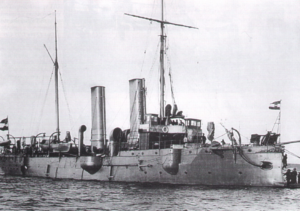
Germany was not opposed to French expansion but wanted compensation for itself. With talk of war in the air, the issue was settled the following November: France took over Morocco as a protectorate in exchange for territorial concessions to German Cameroon from the French Congo. It’s amazing how the imperialist powers thought they had the right to transfer control of a region, or even a whole country, without reference to the people living there. It was beginning to look increasingly like the prelude to a large-scale war, with Britain and France growing closer to each other and Germany appearing to be a little short of friends. After four years, it began to look short of soldiers, too, with the First World War having claimed some 22-million dead. Semantics can become a deadly business. At the start, we had the Triple Entente, made up of France, Russia and Great Britain. Ranged against them were the members of the Triple Alliance: Germany, Austria-Hungary and Italy. In each case, the member countries promised military assistance to each other in the event of attack, although Italy left the Alliance in 1915, when the legal document linking the partners expired. The Triple Entente didn’t end in quite such a bureaucratic way, but then it had never been much of an alliance in the first place, and both French and British politicians expressed relief when Tsar Nicholas II, chose to abdicate. In fact, he had little choice.
Kosovo had been part of the Roman and Byzantine Empires long before the first Serbs migrated there in the 7th century. In mediaeval times, Kosovo became the heart of the Serbian Empire and the site of some architecturally impressive Serbian Orthodox monasteries and churches. In 1389, however, after the Serbs had been defeated in the Battle of Kosovo, the Ottoman Turks took control and during the five centuries of their rule, large numbers of Turks and Albanians had settled there. By the end of the 19th century, Albanians had replaced the Serbs as the dominant ethnic group. After the Second World War, the modern boundaries of Kosovo were established and it became an autonomous province of Serbia within the Socialist Federal Republic of Yugoslavia (SFRY). The Albanians were never very happy with this arrangement and in the 1980s, they staged riots and other forms of unrest in a bid to secure Kosovan independence. In response, Serbia revoked Kosovo’s autonomy status in 1989 and instituted a new constitution. Kosovo could not accept that, of course, and organised a referendum in 1991, declaring Kosovo independent based on the outcome. The Serbs, who still viewed Kosovo as their heartland, responded with repressive measures against the Kosovar Albanians, starting an insurgency against Serb rule.
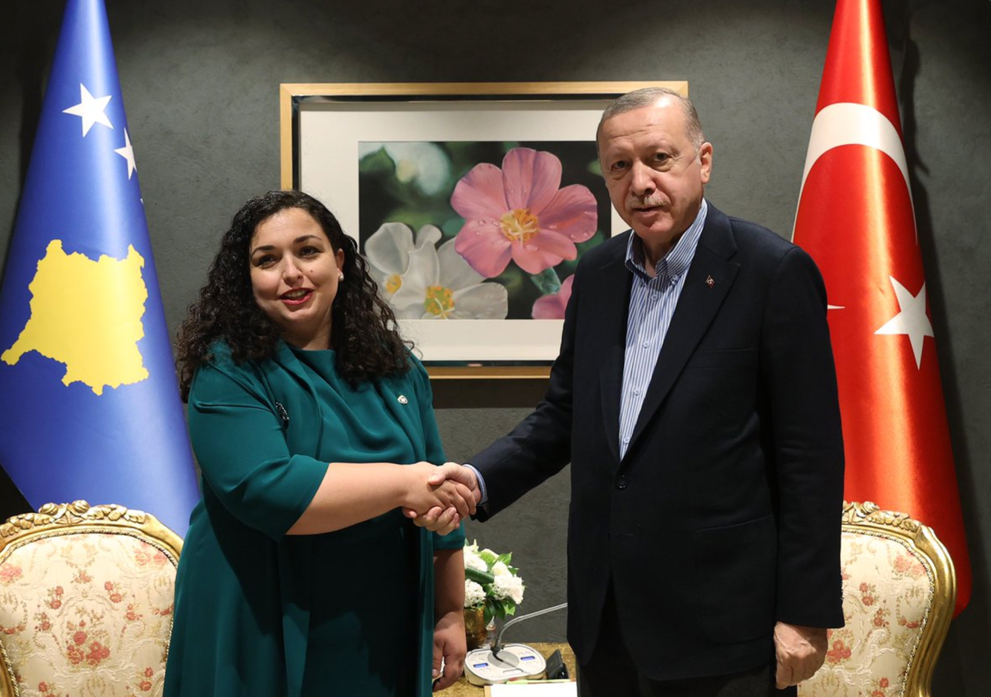
KOSOVO TODAY
I really should explain more about Kosovo; where it is and even what it is. It’s a self-proclaimed independent country – independent from Serbia, that is – with that independence recognised by the United States and most (but not all) the members of the European Union. This gives Kosovo an unusually ambivalent place in the world for its president, Vjosa Osmani to negotiate. You will not be surprised to note that Serbia doesn’t recognise it and nor does Serbia’s pal, Russia (nor does China, for some inexplicable reason). Its name, Kosovo, is a corruption of an old Serbian word meaning ‘field of blackbirds’. Early in the 20th century, Kosovo was swallowed up by Serbia, which later became part of Yugoslavia. By later in the century, ethnic Albanians, who were predominantly Muslim, overtook in numbers the Eastern Orthodox Serbs living there, and this gave rise to inter-ethnic tensions and occasional violence.
1998 saw a bid for freedom on the part, mainly, of the country’s ethnic Albanians, but it became a major cause célèbre, strongly opposed by Serbia and Montenegro, by now the mere rump of what was once a federal state. NATO conducted a bombing campaign on what had been Yugoslavia and its two member states returned to using their individual names, before splitting into those two separate independent countries. Most (but far from ‘all’) countries in the world now recognise Kosovo as an independent country, but Serbia still regards it as part of its territory, although with United Nations help and guidance, Kosovo gradually developed the structures it needed to be considered an independent country, including a government in its capital city, Pristina, which is written as Prishtinë in Albania or Priština in Serbian. However, all is not sweetness and light. How could it be? Years of tension over exactly what Kosovo is have left a fragile, uneasy peace and deep concern about Serbia.
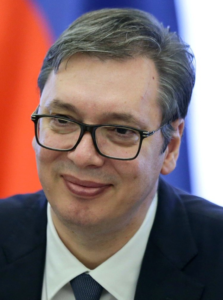
Serbia’s President Aleksandar Vučić has been rumoured to be seeking to establish Russian military bases on Serbian soil. “Serbia does not need anyone’s military base,” Vučić said in a television interview about the allegation. “Serbia will maintain its military neutrality. Serbia will build its own alliances. It won’t be ashamed of good relations with Russia, China, the US and European Union but it will take care of itself.” Vučić has also said he would like to bring back military conscription, which suggests that he’s not expecting a wholly peaceful future.
Serbia has also reacted angrily to the news that Kosovo plans to apply for membership of the Council of Europe, an organisation largely based on a belief in human rights and the rule of law, as well as the ability to ensure that member states behave themselves. There’s a cultural side to it, too. Kosovo’s government says it has already ratified the various conventions to do with “human rights and elementary freedom”, so the process could be quite fast, in theory. Serbia, however, is keen to prevent that from happening. Serbia’s ally, Russia, was obliged to leave the Council following its invasion of Ukraine.
Unrest has started yet again in Kosovo, this time over car registration plates, with Serbian protestors blocking roads and firing guns in the air because they had been ordered to put Kosovo-issued plates on their vehicles. The objections come from the ethnic Serbs who make up just 6% of the population.
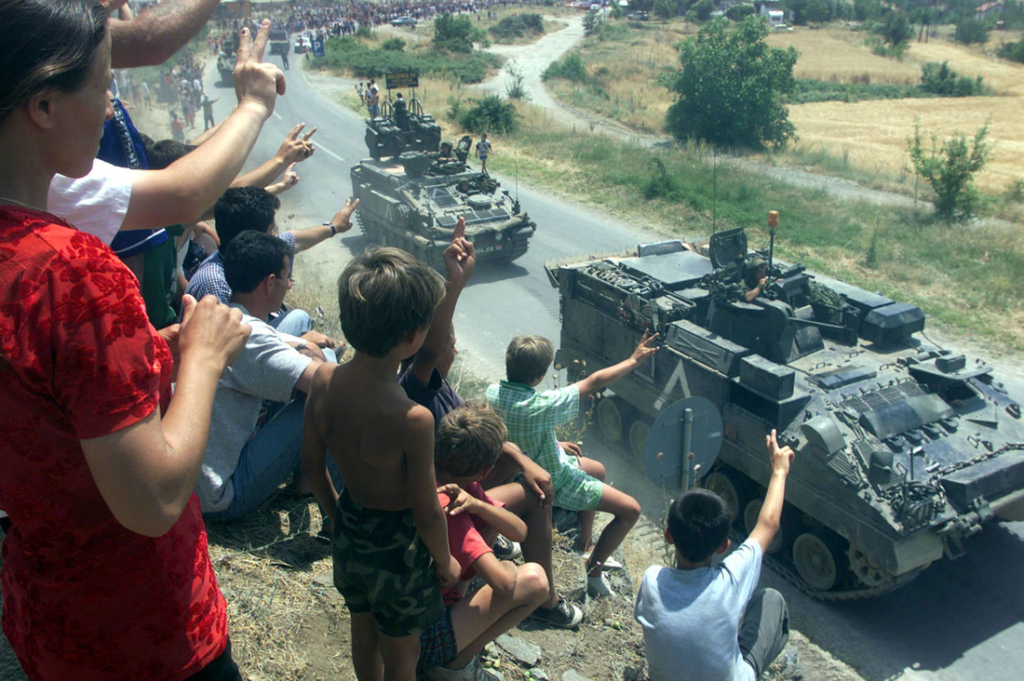
The war that brought Kosovo its independence was bitter and bloody and more than 13,000 people died during it. After it, in 2008, Kosovo declared its independence, although, as I’ve pointed out, it’s not recognised by quite a lot of countries. Serbian president Aleksandar Vučić has pledged that Kosovo will never be independent, or at least that its independence will never be recognised. Needless to say, Russia and China don’t recognise it either,but then neither do 97 other members of the United Nations (at the time of writing), while only 22 out of 27 EU members recognise it, 26 out of 39 NATO members and 31 out of 57 of the member states of the Organisation of Islamic Cooperation.
For many Serbs and Albanians, the war never ended: it’s simply unfinished business. Only Russia and China have gone so far as to block Kosovo from joining the UN. In Kosovo itself, some 50,000 people living in mainly Serb-dominated areas will not use Kosovan-issued licence plates because they still refuse to recognise Kosovan independence. Strangely, Kosovans living in Serbia do have to apply Serb-originated registration plates. The government of Kosovo has accused Serbia of deliberately fomenting trouble, with the support of Russia. Russia blames the unrest (of course) on the Kosovan authorities, but there’s little doubt that Russia has a hand in it, too. One MP from Vučić’s party has said that Serbia will soon be forced to start the “denazification of the Balkans”, borrowing a word from Putin when he sought to justify Russia’s invasion of Ukraine (the politician apologised for using it later, especially as it’s clearly a lie). Putin has been accused of trying to destabilize Europe by encouraging conflicts. Kosovo’s prime minister, Albin Kurti, has said that when Belgrade talks about murder and violence it is talking about itself. Serbia is a much more violent place than Kosovo.
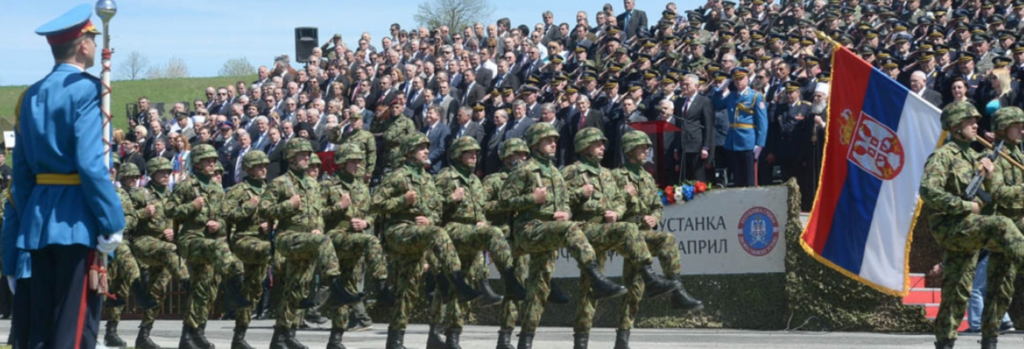
The Serbs, meanwhile, seem to be stirring up fears over an alleged threat of attack by Albanian Kosovans, which President Vjosa Osmani, says is untrue. Vučić even claimed that the authorities in Pristina are preparing to “liquidate Serbs in northern Kosovo” under the guise of a fight against crime. It’s demonstrably untrue. The biggest encouragement for involvement in crime is Kosovo’s desperate poverty. 33% of its people are unemployed, with youth unemployment standing at almost 60%. As a result, around 45% of the population live below the poverty line, most of them in deprived rural areas, trying to eke out a living (or at least to stay alive) through a kind of subsistence farming on very small plots of land. With few washing facilities, personal hygiene is a problem, too, while ethnic minorities face legal obstacles to make their lives even more difficult. The Roma, for instance, and others like the Ashkali (an Albanian-speaking minority who claim to have originated in Persia – now Iran – in the 4th century BCE, but nobody knows for sure) and Balkan Egyptians have trouble obtaining the documents they need to access such benefits as education, health care and social assistance. Domestic violence is rife, partly because of insufficient police and a fractured court system. Even so, Kosovo has a lower crime rate than most of its neighbours, but there is a desperate housing shortage, with more than one in five households reporting two or more people having to share a room. In a very poor country, the Ashkali are among the poorest. But nobody there is exactly well-off: Kosovo’s minimum wage is just €170 per month for those aged 35 to 65. It’s only €130 for workers under 35 years of age.
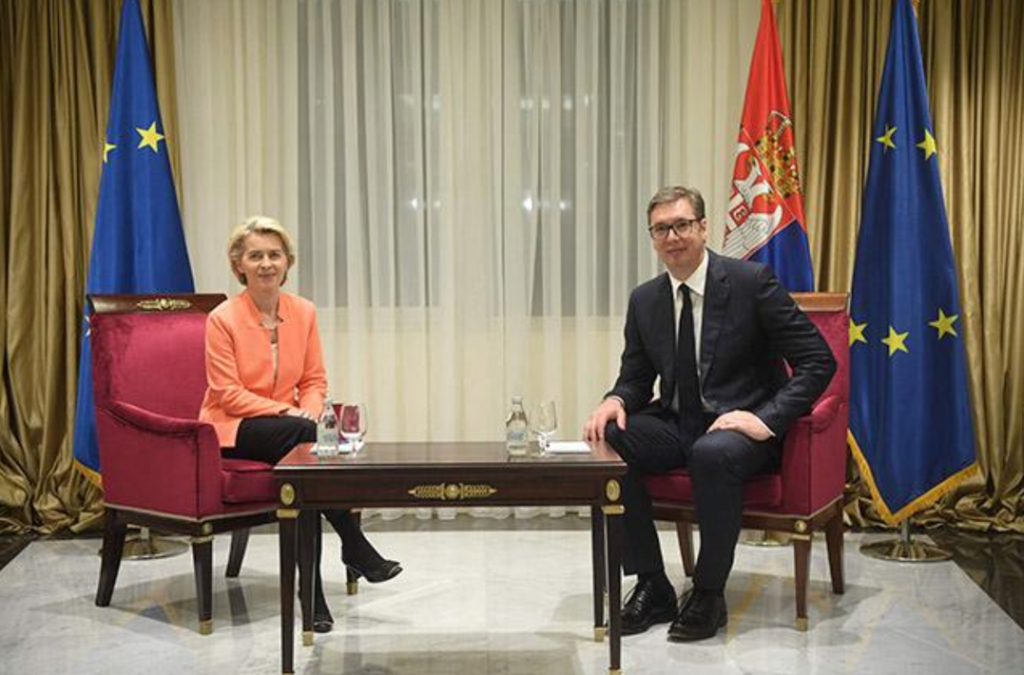
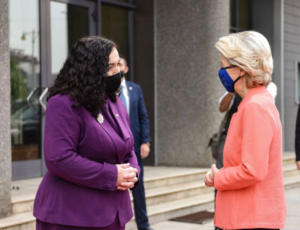
Kosovo, of course, wants to join the EU but that won’t happen overnight, despite Osmani’s determined diplomatic efforts in Brussels. There are other countries ahead of Kosovo in the queue anyway, and that’s far from being the only obstacle. While the plan to standardise vehicle registration plates in the Albanian style, rather than permitting Serbian versions, has been postponed because of the violence the idea provoked, the issue hasn’t really gone away, according to the Politico website. “There’s been chatter all over the world about the next war breaking out in Kosovo,” said Donika Emini, an expert on the Kosovo-Serbia dynamic who heads a network of civil society groups. “This never happened before — we had crises much worse than the one [last week] and the global audience barely paid attention to them.” But, she added, “because of the war in Ukraine, everyone is on high alert.” The media may have made more of the tensions than they really merited. Politico reports that only an hour from the barricades, Pristina played host to a huge open-air concert, which suggests the fear is not overwhelming. The EU has been trying – seemingly without much success – to resolve ongoing issues like the vehicle licensing plates and widening the recognition of Kosovo university diplomas. The tensions continue, then, although Russia has not yet, at any rate, decided to settle the issue in its and its friends’ interests through a Ukraine-style military invasion. Perhaps it feels overstretched after the unexpectedly fierce opposition to its Ukraine ambitions.
SOME THINGS DON’T CHANGE: LIKE HATRED
Serbia began in 1998 to expel ethnic Albanians and so some 800,000 Albanians were forced from their homes. There were a number of attempts by other countries to mediate what was happening which led, in 1999, to intervention by NATO forces that lasted for three months.
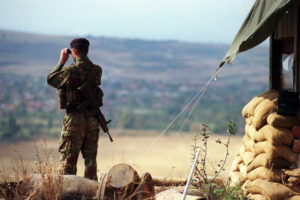
The Serbs found themselves forced to withdraw their military and police forces from Kosovo and a resolution by the UN Security Council placed Kosovo under a temporary administration. The UN began in late 2005 to try and find a more permanent solution but negotiations held in 2006-2007 drew a blank, although the UN’s final report endorsed independence for Kosovo as a solution, albeit one that certainly wouldn’t satisfy the Serbs. Indeed, they refused to accept the judgement and took the issue to the International Court of Justice (ICJ). It didn’t work the way they had hoped, and the ICJ gave the opinion that Kosovan independence did not break any international law. To Serbia’s evident disgust and disapproval, the international community ended Kosovo’s period of supervised independence, so that elections could be held. In 2012, Kosovo held its most recent municipal and national elections, choosing a ruling party committed to self-determination and led by Albin Kurti, a former political prisoner, although he had never been a combatant. Serbia still rejects Kosovo’s independence and refuses to acknowledge it, trying for all its worth to prevent Kosovo from joining international organisations. However, in the middle of August, Vučić travelled to Brussels to visit the NATO headquarters for talks with Secretary General Jens Stoltenberg. In his greeting, Stoltenberg reminded him that: “The EU-facilitated Belgrade-Pristina dialogue is the platform to find a solution that respects the rights of all communities. I welcome the next round of the dialogue taking place tomorrow. I encourage all sides to engage in good faith. To show flexibility. And to be constructive.,” he said. They also discussed the invasion of Ukraine which even Vučić seems to have acknowledged as “unprovoked”, although neither man suggested a way to end it.
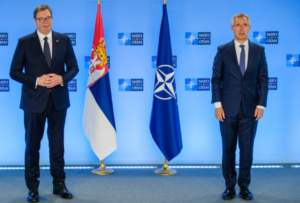
Don’t expect a peaceful handshake and mutual agreement, any time soon, or even ever. Prime Minister Albin Kurti’s attitude to Serbia has been more confrontational than that of his predecessors (and certainly more than Osmani’s), despite Osmani’s peace-keeping moves, while Serbia’s leader, President Vučić has accused Kosovo of provoking the expulsion of Kosovo Serbs and warning: “If they dare to begin persecuting Serbs then there will be no surrender and Serbia will win.” If war should erupt again, whatever Vučić may think, NATO is most likely to have the final word. Unless Russia does. Keeping the lid on this frothing tension would appear to be a near-impossible task. It seems that Serbia and its Russian backer will never consider any sort of peace that leaves Kosovo independent. European Union-led talks between Kosovo and Serbia began in 2011 but have so far failed to achieve any sort of normalisation in relations. Kosovo is recognised by about 100 states, including the US and most EU countries, but Serbia and its allies – which include Russia – refuse to do so. The EU has put a great deal of effort into restarting dialogue between Belgrade and Pristina, and the simple fact that Kurti and Vučić met at all, however unproductively, has been spun as a positive. EU foreign policy chief Josep Borrell said afterwards that “we did not get to an agreement today but that is not the end of the story”.
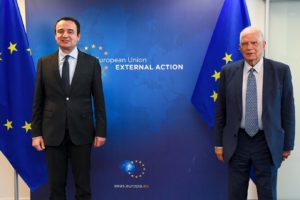
Kosovo signed a Stabilization and Association Agreement with the EU in 2015, and the EU named Kosovo as one of six Western Balkan countries that will be able to join the organization “once it meets the criteria to accede” (Osmani claims it already has). That day may still be a long way off and the last thing the EU needs is a member whose closest neighbour doesn’t recognise its legitimate existence, and which also poses the constant threat of military action, possibly backed by Russia, to seize it back. Perhaps Vučić should take note of a speech written by William Shakespeare in his play, ‘Henry VIII’: “Still in thy right hand carry gentle peace, to silence envious tongues.” I fear there’s not much chance of that. Such a deal of hatred tends to speak more loudly and inevitably drowns out any number of clarion calls for moderation and peace. Vučić would seem more likely to call for war than peace, whatever Osmani may say; we have to hope that not too many people will hear him, even if he borrows Putin’s megaphone to say it with.

